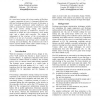433 search results - page 7 / 87 » Activity-driven clock design for low power circuits |
114
Voted
HPCA
2003
IEEE
16 years 2 months ago
2003
IEEE
With the scaling of technology and the need for higher performance and more functionality, power dissipation is becoming a major bottleneck for microprocessor designs. Pipeline ba...
178
click to vote
ARVLSI
1995
IEEE
15 years 5 months ago
1995
IEEE
Precomputation is a recently proposed logic optimization technique which selectively disables the inputs of a sequential logic circuit, thereby reducing switching activity and pow...
100
Voted
ICCD
2001
IEEE
15 years 10 months ago
2001
IEEE
CMOS Phase-locked loops (PLL) are ubiquitous in RF and mixed-signal integrated circuits. PLLs are very sensitive to noise fluctuations on the power and ground rails. In this paper...
126
Voted
ITC
2003
IEEE
15 years 7 months ago
2003
IEEE
In a scan-based system with a large number of flip-flops, a major component of power is consumed during scanshift and clocking operation in test mode. In this paper, a novel scan-...
134
click to vote
DAC
2003
ACM
16 years 2 months ago
2003
ACM
As power consumption of the clock tree in modern VLSI designs tends to dominate, measures must be taken to keep it under control. This paper introduces an approach for reducing cl...

